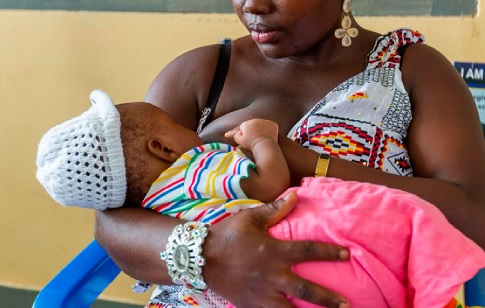Breastfeeding is essential for both early childhood nutrition and mother health. Breastfeeding, particularly exclusive breastfeeding, is critical to a child’s healthy development and survival.
As the world marked the 2024 World Breastfeeding Week with the theme “Closing the Gap: Breastfeeding Support for All,” it became critical to celebrate breastfeeding mothers’ diverse journeys and highlight the critical role of families, societies, communities, and health workers in ensuring every mother can breastfeed successfully.
World Breastfeeding Week is an annual festival conducted from August 1 to 7 to promote awareness and encourage action on breastfeeding-related issues.
The World Health Organisation (WHO) and UNICEF launched a campaign in 1991 to promote exclusive breastfeeding for the first six months of life because health experts believe it provides numerous health benefits, including critical nutrients, protection from deadly diseases such as pneumonia, and fostering growth and development.
Superfood
During a press conference to commemorate the week, Dr. Patrick Kuma-Aboagye, Director-General of the Ghana Health Service, described breast milk as a’superfood’ that provided all of the nutrients and energy requirements for the first six months of life, adding that the infant food had more nutritional benefits.
Read Also: P-Square: Mr. P pens an open letter to brother Rudeboy
“Having over 200 known constituents, as well as others yet to be identified, breastmilk is suited to support the slow and steady growth of humans with rapid brain development and changes to provide nutrition suitable for the baby’s needs, whether born prematurely, at term or as infants grow from month to month.
“Breastmilk is a living fluid that actively protects against infection. Additionally, it reduces the risk of allergies and conditions such as juvenile-onset diabetes in families with a history of these conditions and also programmes body systems that may assist in blood pressure regulation and reduction of obesity risk later in life.
Benefits
“For the mother, breastfeeding reduces the risk of some of the aggressive forms of ovarian and breast cancers; while for the family and nation, it reduces the financial burden of taking care of sick children and contributes to improved productivity for the nation,” added the minister.
Dr. Kuma-Aboagye, who praised the unrivaled benefits of breastfeeding, stated that those benefits were cross-cutting, which is why the GHS and its stakeholders have long stated that nursing, while largely practiced by women, should be a concern for everyone.
He said communities must band together to encourage moms to continue providing this lifesaving, productivity-boosting meal to newborns.
He stated that in 2023, the Service aimed to increase breastfeeding support, particularly for working women.
“We believe that some organisations and facilities heeded this call and are making efforts to provide such spaces for their female employees. We congratulate all such institutions and pledge our support to them if they call on us.
Status quo
According to Dr. Kuma-Aboagye, the country has made some marginal improvements in its breastfeeding indicators, with initiation of breastfeeding within the first hour increasing from 52% to 58% and exclusive breastfeeding increasing from 52% to 53.1%.
However, he stated that as a nation, we were far from meeting our goal of achieving more than 70% in both metrics.
“Our combined efforts are essential to bring these indicators ahead. As a Service, we are working hard to enhance our staff capabilities so that all pregnant women receive the appropriate information and support during prenatal care, birth, and post-discharge care.
“Some research activities in this area have suggested some actions that the service can take and we are working hard to work on some of our challenges,” he told me.
Starting right
He emphasized the need of getting started correctly to fully realize the advantages of the superfood, which is why the GHS launched a program to that end.
“The Ghana Health Service is still pursuing our ‘Start Right, Feed Right, from birth to two years’ campaign as the country’s overall infant feeding strategy, which includes actions promoting breastfeeding and supplementary feeding.
To ensure the success of the ‘Start Right, Feed Right’ project, Dr. Isabella Sagoe Moses, a child health specialist, has recommended all health institutions to encourage moms to start breastfeeding within the first 24 hours following delivery.
To her, nursing neonates within 24 hours of delivery was one of the most important therapies for drastically lowering neonatal mortality.
Dr. Moses indicated that, among other benefits, breast milk administered within 24 hours after birth boosted the newborn’s immune system against most baby killer illnesses.
In 2018, the country’s newborn mortality was 21,000, down from 32,000 in 2011.
Currently, it is estimated that over 30,000 babies die in Ghana each year, with 32 out of every 1,000 newborns dying within one month of delivery.
Dr. Moses referred to the situation as “very alarming and gloomy, requiring urgent attention from all stakeholders.”
She stated that despite WHO’s suggestion for women to exclusively breastfeed their newborns for six months, which Ghana agreed with, a number of difficulties prohibited mothers from following the advise.
She highlighted inaccuracies, myths, and prejudices about exclusive breastfeeding, which are mostly impacted by cultural and socioeconomic origins.
“Often, we hear stories of mothers who start exclusive breastfeeding and stop along the way because their mothers, family relatives or friends claim the breast milk is not enough to satisfy the baby. But it is incorrect,” she stated.
She stated that the breast automatically creates optimal milk to satisfy the infant or babies at each stage of their development, and that “as your baby needs more milk and nurses more, your breasts naturally respond by making more milk.”
Jaundice
She emphasized the need of immediately beginning exclusive breastfeeding for newborns to reduce the risk of neonatal jaundice.
She noted that, despite nurses’ instructions for moms to begin exclusive breastfeeding immediately, a significant proportion of mothers postpone starting, potentially leading to future health difficulties for the child.
Early starting and exclusive breastfeeding are recommended for simpler follow-up.Encourage the woman to start breastfeeding in the labor ward.
You may still encourage her to initiate, regardless of whether she had a caesarian section.
“So let’s try to support the mothers to initiate early and then we can all support exclusive breastfeeding…The support is so important,” she emphasised.
Normalise breastfeeding in public spaces
Dr. Sagoe-Moses advocated for the normalisation of breastfeeding in public places across the country. She opposed unjustified public prejudice against nursing moms and advocated for women to be able to nurse openly and without fear of harassment.
“Mothers breastfeeding their babies in public is not a crime or taboo. But we are making it so in this country, making breastfeeding mothers restrain their hungry babies from sucking in public.


























